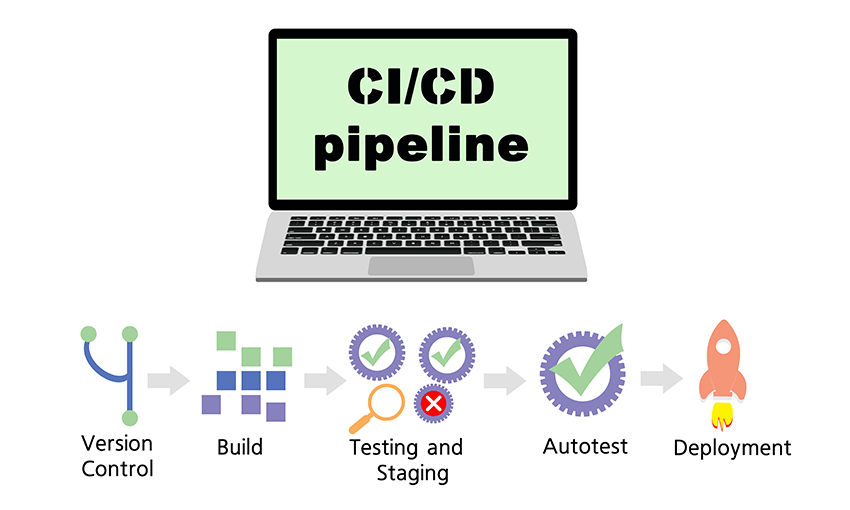Organizations across the globe continue to embrace an agile and DevOps process, enabling better product quality and faster delivery speed. Continuous integration and continuous delivery (CI/CD) represent some of the core processes to achieve faster application development.
According to a 2020 state of CI/CD report from DZone, 74% of teams reported an increase in delivery speed after implementing a CI/CD pipeline. Not exactly a surprise, since the best CI/CD tools leverage your existing workflow to implement automated features and create robust pipelines that empower your team to increase productivity. With these tools, you can save time, money, and resources by automating workflows, fixing bugs, and enabling better collaboration.
There are several DevOps tools available for different processes and workflows. However, if you are only looking for the best CI/CD tools for your pipeline, this article presents 17 of the best CI/CD tools for the rest of 2021 and 2022.
What Is Continuous Integration & Continuous Delivery?
Organizations strive for agility in development, especially from code commit to production. As a result, continuous integration and continuous delivery have become synonymous with the automation and rapid deployment of code.
Continuous integration is the software development practice of automating the process of merging and integrating developer code changes to the team’s main branch frequently. Each merge results in an automated build. If this process fails, the development team receives a report on the issue and can quickly resolve it. A successful build may trigger a continuous delivery process.
Continuous delivery comes after continuous integration. It is an automated process of deploying all code changes to a testing environment or production after a successful build. With this, you can automate the software release process, ensuring incremental batch releases that make it easy to identify and fix issues.
Benefits of CI/CD
Apart from a faster application development process, CI/CD offers several other benefits, such as:
- Faster MTTR: Also known as mean time to repair, this metric measures the amount of time it takes to fix a broken functionality or feature. CI/CD enables you to get faster feedback about the product in order to fix errors as soon as possible before release. It makes it easier for you to isolate a problem and fix it before the error affects the whole system.
- Enhance Innovation: The faster you can develop, the faster you can innovate. Innovation is at the core of every agile process. With the automation from CI/CD, you have the time, resources, and flexibility to deliver exceptional digital experiences and meet your customer’s needs.
- Consistency: With small batches of updates, you can reduce the likelihood of errors and technical difficulties while ensuring that the overall system configuration and build cycle conforms and remains the same throughout.
Read more on: CI/CD and DevOps: What’s the Difference?
Top 17 CI/CD Tools
Jenkins
Jenkins is one of the most popular CI/CD tools available today. It is a free, open-source software solution written in Java that automates build, test, and deployment capabilities for software development projects. It runs on multiple platforms such as macOS, Windows, Linux, and other Unix-like operating systems. On top of that, Jenkins comes with hundreds of plugins that provide you with features to evaluate code quality, monitor test scripts, and in general, simplify the process of configuring and tailoring requirements to your needs.
Features:
- A large and active community of users
- Easy to install and upgrade across various operating system
- Intuitive and user-friendly interface
- Availability of numerous user-built plugins to extend capabilities
- Easy environment configuration
- Supports a master-slave architecture
- Provides support for several version control systems like GIt, Mercurial, Maven
- Provides notification for build status
- An extensive and readily available documentation
- Supports scheduling of integration procedures
CircleCI
CircleCI is another popular CI/CD tool. It provides automation for the entire DevOps pipeline--planning, development, build and testing, and deployment. CircleCI can also run on private infrastructure behind a firewall or in a cloud-managed environment. With integrations with repositories like GitHub and Bitbucket, you can automatically pull code into CircleCI from commit change and execute builds. CircleCI is an impressively flexible tool that is ideal for quickly setting up small projects.
Features:
- Fast and easy setup process
- Build time by balancing and splitting tests across several containers and virtual machines
- Supports Sinatra, Ruby on Rails, Python, Java, Node, PHP, Clojure, and Node
- High level and easy customization with Docker support
- Personalized email notifications and insights
- Provides streamlined and precise automated debugging processes
- Simple and easy YAML configurations
- Easy support for several build tools like Maven and Gradle
TeamCity
TeamCity is a continuous integration solution from JetBrains. It provides a server that helps to automate the build process. It is a Java-based solution for multiple platforms such as Windows and Linux environments that you can easily integrate with Visual Studio or other IDEs. Starting from TeamCity 2019.1, you can easily integrate with GitLab and BitBucket for pull requests.
Features:
- Supports parallel build across multiple platforms
- Extendable and easy-to-customize builds
- Provides user management features such as user roles, groups, authentication methods, and log history
- Provides reusable configuration and settings that eliminate the need for code duplication
- Comprehensive version control features for large projects
Bamboo
Bamboo is a Java-based continuous integration and release management tool from Atlassian. It automates the process of managing software applications such as build, test, and deployment cycles. With Bamboo, you can make code reviews more efficient by bringing together developers, testers, and build engineers—while also ensuring the security of critical operations like production deployments. Bamboo integrates with code management platforms like BitBucket.
Features:
- Can run hundreds of parallel tests simultaneously
- Automated container image creation
- Multiple access for developers and testers on all builds
- Provides support for up to 100 build agents remotely
- Detects changes in the repository and triggers build accordingly with push notifications and scheduling
- Automatically detects and applies CI procedures to new branches in Mercurial, Git, and SVN Repos
GitLab
GitLab is a suite for managing application development and deployment lifecycle. The solution provides a Git repository management with features that include analytics, issues detection and tracking, and a project wiki. In addition to these, GitLab features extensive functionalities for CI/CD processes. It enables automation of build configuration & management, testing, and deployment of code at each commit.
GitLab is a suite of tools for managing different aspects of the software development lifecycle. The core product is a web-based Git repository manager with numerous features such as issue tracking, analytics, and a Wiki.
GitLab allows you to trigger builds, run tests, and deploy code with each commit or push. You can build jobs in a virtual machine, Docker container, or on another server.
Features:
- Code management features to split files into branches and manage each branch separately
- Rapid code iteration: the platform controls code quality, checks dataflow, and delivery of end values before deployment
- Cooperation tools: teams can work on a project simultaneously and receive updates when any member updated code files
- Testing and QA: GitLab scans containers, performs security testing, runs application security tests, and scans dependencies
- Automation: GitLab features thousands of algorithms for testing and deployment automation
Buddy
Buddy is a CI/CD solution to automate the build, test, and deployment of code from popular code management platforms like GitLab, GitHub, and BitBucket. It allows developers to upload code directly from GitHub and GitLab, monitor and receive notifications, and organize projects in Docker containers. These containers come with pre-set frameworks and languages - you can select from more than 10+ available options.
Features:
- Provides easy customization of Docker-based images
- Customizable and reusable build and test environments
- Real-time progress logs and monitoring with unlimited history
- Extensible services with MariaDB, Mongo, PostgreSQL, Redis, RabbitMQ, Selenium Chrome, and Elastic
- Simple workflow management for collaboration and communication with templates for cloning, exporting and importing pipelines
Travis CI
Travis CI is a continuous integration software for automatically building and testing projects. It allows teams to begin testing code in minutes by linking cloud projects to the platform. With a vibrant open source community of over 700,000 users, Travis CI finds widespread use among industry professionals such as Zendesk, Heroku, and BitTorrent.
Features:
- Provides support for several languages such as C, C#, JavaScript, Perl, Node, PHP, Java, Python, and R
- Fast and easy setup process
- Enables simple YAML file configurations
- Automatically updates GitHub repositories with new commits
- Provides support for multiple platforms like macOS and Linux
- Notification updates on Slack, email, and other similar services
- Enables deployment to several cloud services
Codeship
Codeship is a hosting web platform for automating software releases and tracking manual and automated tests. It allows users to build multiple projects simultaneously while integrating with AWS instances for memory, size, and CPU.
Features:
- Simple and intuitive interface
- Hundreds of available third-party integrations with a built-in library for automation management and collaboration
- Access to a simple real-time project dashboard and smart notification system
- Provides AWS and CPU configurations
- Uses code analysis and progress monitoring to evaluate the quality
- Simple configuration files for setting up workflows
- Excellent developer support
- Easy UI and turnkey environment speed up builds and deployments
Semaphore
Semaphore is a hosted server for continuous integration and delivery processes. It provides integration with GitHub and supports Dicker and parallel test execution. In general, it is a DevOps tool that automates processes such as deployment, testing, and maintenance.
Features:
- Predefined pipeline automation procedure
- Supports Docker-based container configuration for development and testing
- Integration with GitHub
- Provides Boosters - a feature that reduces the run time of Ruby projects' test suite by automating parallel execution of builds
- Automatically scales projects based on usage
Codemagic
Codemagic is a cloud-based CI/CD software for mobile applications that helps you build, test, and deploy applications. It facilitates native and cross-platform application development processes. The platform provides automatic setup and configuration.
Features:
- Simplified configuration and setup
- Automated build for each commit
- Provides automated test: UI tests, unit tests, code analysis, and parallel testing
- Provides a detailed overview of the build and test status
- Seamlessly integrates with several app development tools and mobile app platforms like iTunes, GooglePlay, Crashlytics, and TestFairy
- Extensive and easy-to-understand documentation
Postman
Postman is an excellent tool for API development that is used by millions of developers and companies globally. It provides a simple interface for sending requests and editing parameters of any platform easily. It helps to unpack and parse APIs written by others or testing your own. In addition, it provides a collaboration feature that enables development teams to work together efficiently from any location.
Features:
- Easy and intuitive interface for API development
- Provides an API endpoint for any language you want including Python, JavaScript, and Java
- Unlimited storage of headers and payloads
- Provision for writing API documentation
- A large and active community of developers
CloudBees
CloudBees is a cloud-based CI/CD platform based on Jenkins that provides a flexible and robust framework for automating adaptive release orchestration. It helps development teams rapidly adapt and implement release procedures at any scale.
Features:
- Provides CloudBees analytics for tracking progress and identifying patterns across all DevOps processes
- Container orchestration and microservice deployment
- Reusable component
- Automatic rollback capabilities
- Automatic data collection
- Enterprise-level scalability
- Several plugins and integrations
Copado Core
Copado is a native DevOps automation platform for Salesforce. It enables fast and error-free cloud release management. It provides an enterprise-class platform that integrates fully with Salesforce Clouds and Salesforce DX.
Copado enables organizations to streamline DevOps processes with one solution that seamlessly integrates core functions, automates manual tasks, and allows teams and managers to access all DevOps data across the release pipeline.
Features:
- CI procedures without Jenkins
- Uses OAuth for metadata deployment
- Versioning & branch management
- Automatic backup of metadata
- Code analysis
- Provides a story-centric model for users enabling integration with Jira and Azure DevOps
GoCD
GoCD is an open-source, on-prem server for continuous delivery from ThoughtWorks. GoCD allows businesses to build and deploy software with complete visibility and control. It is a continuous deployment tool for automating the entire deployment process from build to test and release.
Features:
- Complex workflow modeling with parallel execution and dependency management
- A simple method to pass binary packages from stage to stage
- Access to your workflow from start to finish
- Easily tracking of changes from commit to deployment
- Deploy versions at any time with manual triggers
- Auditing and security
- Multiple languages and framework support
- Provides detailed test report
- Reusable pipeline configurations with the template
CruiseControl
CruiseControl is an open-source continuous integration tool that has been in use for a long time. It oversees the continuous build process with dozens of third-party tools and plugins for source control, builds, and notification management.
Features:
- Support for several frameworks and languages
- Feature-rich & easy-to-use web interface
- Detailed report on build history
- Manages numerous projects in multiple languages and release cycles
- Custom build loop for each build cycle
- Provides visualization for build status on GUI interface
Bitrise
Bitrise is a mobile Ci/CD tool for app developers to build, test, and deploy applications. It allows for rapid iteration, better application development, and increased productivity. Bitrise boasts an esteemed range of clients that include Duolingo, Grindr, and Just-Eat.
Features:
- User-friendly interface and configuration with YAML file repository
- Extensive and easy-to-understand documentation and a vibrant community
- Regular updates and improvements
- Shareable procedures for task setup
Applivery
Applivery is a robust mobile app solution for continuous deployment. It provides you with full control over a mobile application pipeline through distribution, automatic updates, governance and compliance, feedback, and report generation.
Features:
- Device provisioning
- App management with access controls and permissions
- Advance location sharing and WiFi configuration management
- Data management
Achieve Maximum Efficiency With The Right CI/CD Tool
For any organization to achieve DevOps success, CI/CD tools represent one of the most important business investments. Choosing the best tool for your organization can be somewhat daunting in light of the variety of available release management tools on the market. It’s essential to pick a tool that adequately meets organizational requirements, goals, and the existing tech stack.

 Alexander Fashakin
Alexander Fashakin




